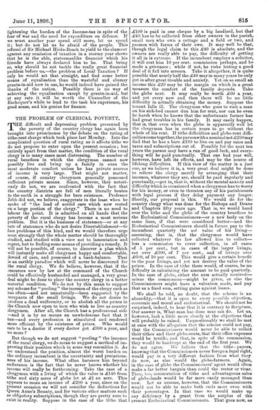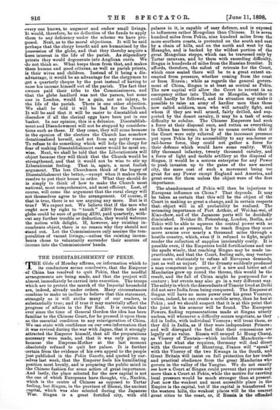THE PROBLEM OF CLERICAL POVERTY. T HE difficult and depressing problem
presented by the poverty of the country clergy has again been brought into prominence by the debate on the rating of tithe-rent charge which took place last Monday. Into the complicated question of rural rating as it affects tithe we do not propose to enter upon the present occasion ; but entirely apart from that matter, the condition of the rural clergy is in many eases most distressing. The number of rural benefices in which the clergyman cannot now possibly live and bring up a family in even the most moderate comfort unless he has private sources of income is very large. That might not matter, of course, if country clergymen generally possessed sufficient private means. Since, however, they notori- ously do not, we are confronted with the fact that the country districts are full of men literally beaten to the earth in a struggle for bare existence. Professor Jebb did not, we believe, exaggerate in the least when he spoke of "the load of sordid care which now rested on a large portion of the clergy." There is no need to labour the point. It is admitted on all hands that the poverty of the rural clergy has become a most serious problem. But it is the business of statesmen—or at any rate of statesmen who do not desire Disestablishment—to face problems of this kind, and we would therefore urge most strongly that the whole matter should be thoroughly studied, and studied with a view not to lamentation and regret, but to finding some means of providing a remedy. It will not be possible, of course, to discover a plan which will instantly make all clergymen happy and comfortable, devoid of care, and possessed of a bank-balance. That is an earthly paradise which will never be discovered for the rural clergy. We do believe, however, that if the resources now by law at the command of the Church could be effectively husbanded and managed, a very great deal might be done to place the country clergy in a better material condition. We do not by this mean to suggest any scheme for " pooling " the incomes of the clergy such as has often—and not unnaturally—been suggested by the occupants of the small livings. We do not desire to produce a dead uniformity, or to abolish all the prizes in the Church now open to men who wish to live as country elergymen. After all, the Church has a professional side —and it is by no means an unwholesome fact that it has—and every profession is stimulated and rendered more efficient by the existence of prizes. Who would care to be a doctor if every doctor got 2300 a year, and no more ?
But though we do not suggest " pooling " the incomes of the rural clergy, we do mean to suggest a method of im- proving their position which in some way resembles it. As we understand the position, almost the worst burden on the ordinary incumbent is the uncertainty and precarious- ness of his income. What often harasses him beyond endurance is the fact that he never knows whether his income will really be forthcoming. Take the case of a clergyman with a living of which the value is 2140 from tithe and sixty acres of glebe let at 21 an acre. This appears to mean an income of 2200 a year, since on the present occasion we will not consider the deductions for Queen Anne's Bounty, and for various other matters such as obtig subscriptions, though they are pretty sure to exist in reality. Suppose in the case of the tithe that 2100 is paid in one cheque by a big landlord, but that 240 has to be collected from other owners in the parish, small men who own a cottage and a field or two, and yeomen with farms of their own. It may well be that, though the legal claim to this .240 is absolute, and the owners are really able to pay, the difficulty of getting it all in is extreme. If the incumbent employs a solicitor, it will cost him 10 per cent. commission perhaps, and be made a grievance ; while if not, he risks letting a good deal of it fall into arrears. Take it altogether, it is quite possible that nearly half the 240 may in many years be only got in after great trouble and anxiety. Yet on so small an income this 220 may be the margin on which in a great measure the comfort of the family depends. Take the glebe next. It may really be worth 260 a year, and yet every now and then there will be no little difficulty in actually obtaining the money. Suppose the tenant falls ill. The clergyman who goes to visit a man on his sick-bed cannot dun him for rent, nor can he even. be harsh when he knows that the unfortunate farmer has had great troubles in his family. It may easily happen,. that is, that even when the glebe is apparently well let the clergyman has in certain years to go without the whole of his rent. If tithe difficulties and glebe-rent diffi- culties come together, the parsonwith a nominal net2250 may find that he has a bare 2180 to live on and pay rates and taxes and subscriptions out of. Possibly for the next ten years the parson may have a run of good luck, and every- thing will be paid punctually. That one bad year will,. however, have left its effects, and may be the source of lifelong difficulties. If this view of the matter is a just one, as we believe it is, a very great deal might be done to relieve the clergy merely by arranging that their incomes, whatever they are, should be paid regularly and punctually,—got in, that is, without the mental anxiety and difficulty which is occasioned when a clergyman has to worry for his money, or even to threaten any of his parishioners with legal process if they delay payment any longer. Shortly, our proposal is this. We would do for the country clergy what was done for the Bishops and Deans. and Chapters fifty years ago. That is, we would hand over the tithe and the glebe of the country benefices to the Ecclesiastical Commissioners—or a new body on the same lines, if that were considered better—and the Ecclesiastical Commissioners should in future pay to the incumbent quarterly the net value of his living— assuming, that is, that the clergyman would have collected whatever the law allowed him to collect— less a commission to cover collection, in all cases of 5 per cent., but in cans of the larger livings, say over 2300, of 7 per cent., and of livings over 2600, of 10 per cent. This would give a certain benefit to the poor livings, and yet not destroy the value of the prizes. In the case of tithe there would, of course, be no difficulty in calculating the amount to be paid quarterly. In the case of glebe, either the sum actually received--. minus the commission—might be given, or else the Commissioners might have a valuation made, and pay that as a fixed sum, setting gains against losses.
We shall be told, no doubt, that the scheme is an absurdity,—that it is open to every possible objection, economic and moral and ecclesiastical. We should not be surprised, indeed, to hear that it is contrary to Scripture. Our answer is, What man has done man can do. Let us, however, look a little more closely at the objections that will probably be raised. Unquestionably we shall be met at once with the allegation that the scheme could not pay, that the Commissioners would never be able to collect their tithes and their glebe-rents, that their office expenses would be terrific, and that, in spite of the commission, they would be bankrupt at the end of the first year. We do not agree. We believe that the tithe - payers, knowing that the Commissioners never forego a legal right, would pay in a very different fashion from what they do now, as also would the glebe-farmers. Again, in the case of glebe the Commissioners' agent would often make a far better bargain than could the rector or vicar. Then, too, commutation of tithe and advantageous sales of glebe-lands would be far more easily managed than now. Let us assume, however, that the Commissioners would not be able to make both ends meet even with their percentages. In that case we would make up any deficiency by a grant from the surplus of the present Ecclesiastical Commissioners. That goes now, as .every one knows, to augment and endow small livings. It would, therefore, be no deflection of the funds to apply them to any deficiency under the scheme we have pro- posed. Next, as to the moral objections. It will be said perhaps that the clergy benefit and are humanised by the possession of the glebe, and that they thereby acquire a leen interest in the life of the parish. As stipendiary priests they would degenerate into Anglican cures. We .do not think so. What keeps them from that and makes them human and good citizens, as well as parish priests, is their wives and children. Instead of it being a dis- advantage, it would be an advantage for the clergyman to get a quarterly cheque by the post instead of having to raise his income himself out of the parish. The fact that owners paid their tithe to the Commissioners, and that the glebe landlord was not the parson, but some one in London, would be a gain, not an injury, to the life of the parish. There is one other objection. We shall be told it will be bad for the Church. It will be said that it will be easier to disestablish and disendow if all the clerical eggs have been put in one basket. In our opinion, this is a delusion. Disestablish- ment and Disendowment will not be stopped by considera- tions such as these. If they come, they will come because in the opinion of the electors the Church has somehow denationalised herself, and not from any petty reason. To refuse to do something which will help the clergy for fear of making Disestablishment easier would be most un- wise. Next, we shall be told that the Liberationists will object because they will think that the Church would be strengthened, and that it would not be wise to stir up Liberationist feeling. That is, again, a most foolish argument. The less Churchmen think of the bogey of Disestablishment the better,—except when it makes them resolve to put their house in order. What they should do is simply to think of how to make the Church most national, most comprehensive, and most efficient. Last, of course, will come the argument that the rural clergy will not themselves agree to the arrangement. Of course, if that is true, there is no use arguing any more. But is it true ? We expect not. We believe that if the men who ought now by right to " touch " £200 from tithe and glebe could be sure of getting £190, paid quarterly, with- out any further trouble or deduction, they would welcome the notion with delight. If, however, any existing in- oumbents object, there is no reason why they should not -stand out. Let the Commissioners only assume the tem- poralities of vacant livings,—unless the existing incum- bents chose to voluntarily surrender their sources of .income into the Commissioners' hands.







































 Previous page
Previous page